10 Ways to Fight Fatigue on a Vegan Diet
If you’re on a vegan or plant-based diet and are always feeling tired or run down, then you need to check out these 10 ways to fight fatigue on a vegan diet. I’m sharing these tips along with my personal story of fatigue on a vegan diet.

10 Ways to Fight Fatigue
Whether you’re new to a vegan or plant-based diet, or you’ve been doing it for awhile, you may start to experience fatigue, headaches, tiredness, or mood changes. Some of the common questions and concerns include:
- I went vegan or vegetarian and I’m feeling weak or tired.
- I went vegan and I’m feeling depressed.
- My adrenal fatigue got worse on a vegan or plant-based diet.
- I’m eating a vegan diet and getting dizzy spells.
If any of these issues related to you, then read on! You’ll probably find at least one tip or more that can help resolve your fatigue on a vegan or plant-based diet.
Plus, be sure to read the section at the end of this post to help determine if dietary changes may be necessary to help resolve your tiredness.
1. Get good quality sleep
Believe it or not, but the most common reason for fatigue is poor sleep, or not getting enough sleep.
I went through a period of several months where I would go to bed at a normal time, but wake up only 4-5 hours lately completely awake. So, rather than toss and turn for hours, I would get up but then be exhausted later in the day.
Whether you have insomnia like I had, or you have sleep apnea, hormone imbalances like estrogen dominance, or something else that is causing sleep disruptions, it is important to address this issue.
In regards to a plant-based diet and disrupted sleep, there could be several issues at play.
For instance, are you eating enough, especially later in the day? If you are waking up hungry, then you need to increase your calories overall. You may also need to adjust your macronutrients to increase satiety.
Secondly, have you developed any nutrient deficiencies on a vegan diet? Issues like low iron can lead to restless leg syndrome which can definitely make it harder to sleep. In this case, you’ll need to work with your healthcare provider to increase sources of iron (or maybe even take supplements) to increase your iron.
You may need to consult your healthcare provider to help rule out any other conditions that might be affecting your sleep. Once you get your sleep under control, you will likely feel less fatigue.
2. See professionals and get appropriate tests to identify medical problems
Don’t wait too long to try and figure out if your fatigue is related to health condition. Fatigue can often be related to an autoimmune disease such as Hashimoto’s Thyroiditis.
Women’s concerns about fatigue can often be dismissed by doctors, so it’s important to be your own advocate and ask that your thyroid levels be tested.
if not well-planned, vegan diets can lead to deficiencies in certain nutrients such as vitamin B12, omega-3 fatty acids, iron, and zinc, which are important for immune system function.
A deficiency in these nutrients could potentially contribute to immune dysregulation.
If your thyroid is healthy and you can rule out thyroid disease as the cause of your fatigue, then it’s also worth having your ferritin levels tested to make sure you aren’t anemic.
Learn more about ferritin testing and how you can order your own lab tests.
3. Take appropriate supplements for fatigue
Your doctor or healthcare provider can likely suggest some supplements to help with your tiredness.
Whether you are in need of more protein, more iron, or something else, it’s important to get some expert input about your individual situation.
And, be sure to check out this article with natural ways to increase energy which includes a whole list of supplements that can help.
You may also want to read my articles on the best supplements for women over 30 and the best supplements for women over 50.
4. Use a plant-based protein powder supplement and eat more protein rich plant foods
While many vegan diet advocates say that you can get all the protein you need from whole food plant sources, there are some women who need more protein.
This was the case for me when I was on a vegan diet. While I ultimately stopped being vegan, I usually felt less tired when I added a plant-based protein powder to my morning smoothie.
There are some great plant-based protein powders on the market now, and you can choose from a variety of ingredients including rice protein, pea protein, hemp, soy, and more. Just try a few different brands and see which one works best for you.
Check out why list of the best clean protein powders.
5. Practice stress management
Since there are so many stressors in the world right now, it’s that much more important to learn to manage that stress. If you don’t, then you will likely feel run down and not as energetic as you normally feel.
Stress management can include everything from meditation, sitting quietly, spending time with friends, being outside in nature, or journaling. Or, if you are truly suffering, you can also reach out to find a therapist who can help you develop coping skills.
6. Get appropriate exercise
While getting daily movement is important, you might need to make sure you aren’t working out too hard. Fatigue is an important indicator that you might be over-training or under-training.
Some experts say that most adults need about 30 minutes of exercise a day.
7. Drink green tea
While hyping yourself up on caffeine isn’t the best way to combat fatigue, a glass of green tea can help. In addition to being high in antioxidants, green tea also contains l-theanine. L-theanine can help improve focus and mood.
You can buy green tea loose or in bags, or you can also try match (learn about the health benefits of matcha). Don’t miss my recipe for Coconut Matcha Latte.
8. Eat a variety of plant-based foods with minimal processing
When you’re eating vegan, it can be tempting to turn to vegan junk foods. Fake meats are not healthy foods, and neither are sugar-filled vegan desserts. Learn more about the risks of plant-based meats.
Instead of eating processed foods with refined oils and sugars, it’s better to choose whole foods such as fruits, vegetables, legumes, grains (if they work for you), nuts and seeds.
If you are having a hard time figuring out how to eat on a vegan diet, then you might benefit from consulting a dietitian or nutritionist who can help you create a meal plan that is tailored to your individual needs.
You may also want to read this article about myths of a plant-based diet.
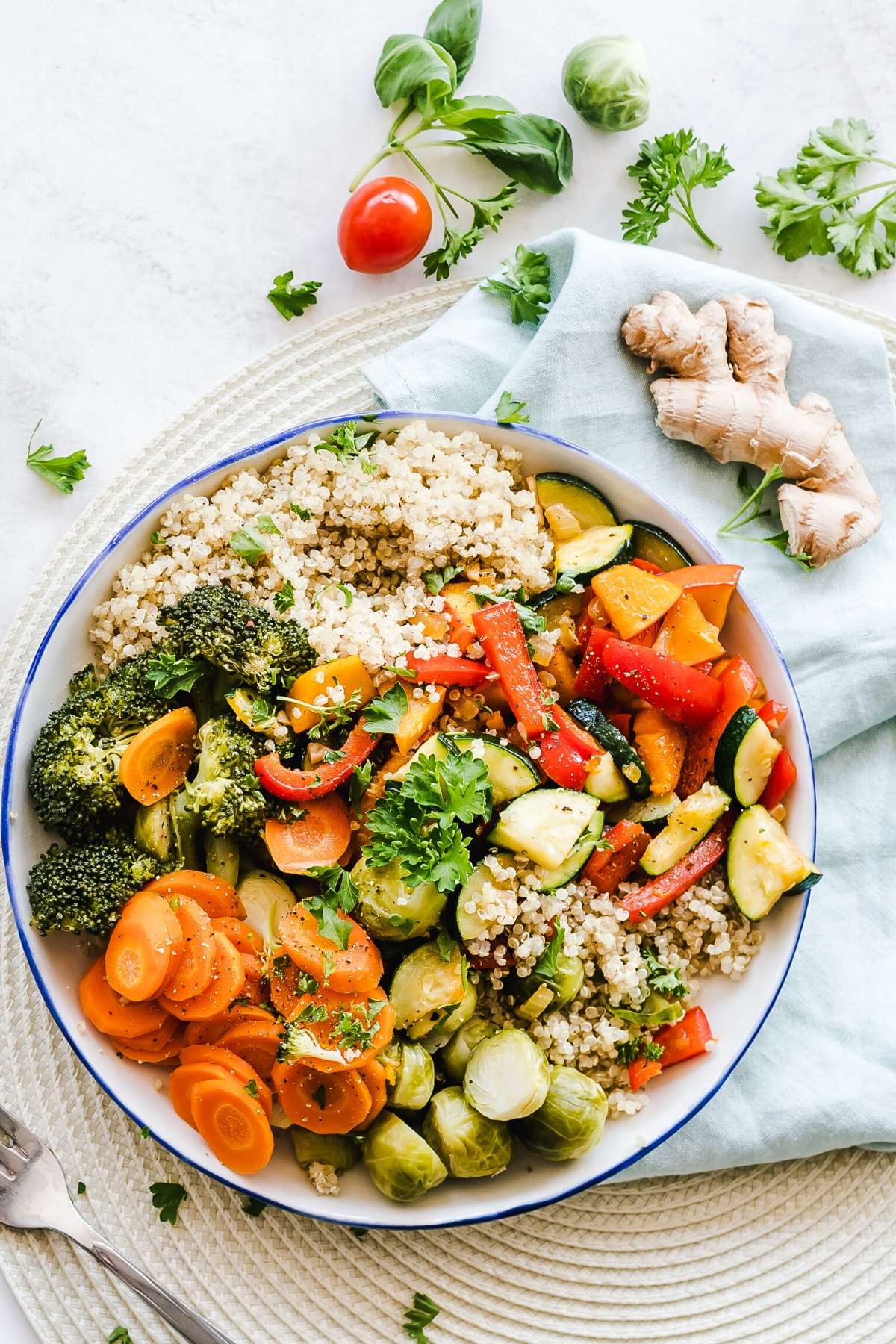
9. Soak and sprout foods
If you find that you feel really tired or bloated after eating a plant-based meal, then you might try soaking and sprouting your foods. Beans, nuts, seeds, and many grains can all be soaked before being cooked.
While it does take extra time to soak and sprout your foods, it can make all the difference in how your body digests those foods.
10. Consume minimal refined sugar
While eating sugar can give you more energy in the short term, you’re probably familiar with the energy crash that can occur once the sugar high wears off. It’s important that you wean yourself off too much refined sugars.
it can be hard to get over a sugar addiction, but you can move toward natural sugars from fruits and dates to help.
See my related article with the benefits of going sugar-free.
Vegan Fatigue FAQs
It is definitely possible that the cause of your fatigue is that a vegan diet is not working for you. There are some health risks that come with a vegan diet, and not everyone knows about these risks. Consider the differences between vegan and vegetarians and think about expanding your dietary choices.
If you determine that a vegan or plant-based diet isn’t for you, then you might need to consider re-introducing meat back into your diet.
It’s impossible to list all the potential causes of fatigue, so it’s probably a good idea to consult a healthcare provider to rule out any major nutrient deficiencies or diseases that may be causing you to feel fatigued.
You can also check out this post with reasons and tips to help if you’re feeling tired all the time.
More Health Articles You Might Like
Conclusions
If you are on a vegan diet or a plant-based diet and experiencing fatigue, there are several ways to try and feel more energetic. If your tiredness does not improve, then it may be time to consider seeing a dietitian or your doctor to rule out other conditions.
Don’t forget to join my newsletter list to get exclusive clean eating recipes and tips. The newsletter is 100% free with no spam; unsubscribe anytime.
About the Author: Carrie Forrest has a master’s degree in public health with a specialty in nutrition and is studying to be a holistic nutritionist. She is a top wellness and food blogger with over 5 million annual visitors to her site. Carrie has an incredible story of recovery from chronic illness and is passionate about helping other women transform their health. Send her a message through her contact form.
Note: this post is for informational purposes only and is not intended as medical advice. Please consult your healthcare provider for recommendations related to your individual situation.





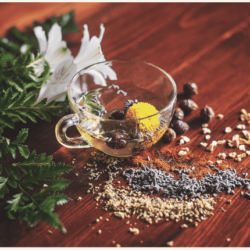
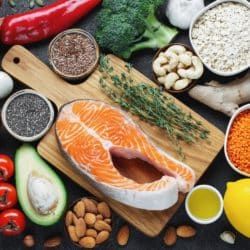


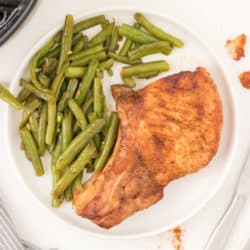


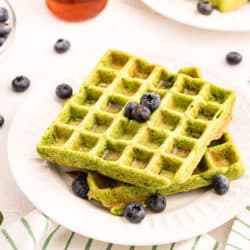



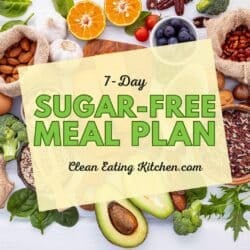




Hi Carrie, I hope you don’t mind that I mentioned this post today on my blog in context of high protein vegan eats.
Thank you for including my link on your blog, Janet, and I’m happy you discussed the issue, too.
Hi Carrie! I LOVE your recipes and site. i’ve sent it to so many friends and family members and they enjoy it as well.. so THANK YOU :0) it’s too bad your app isn’t available for android phones or that would’ve been awesome!! at least i have your site :0)
i’ve seen Dr. Furhman on tv and i’m reading the Eat to Live book. im looking to loose weight and improve health. i have noticed by eating a vegan diet – i feel less bloated and better in general so i know its the way to go for me (so far lol). i just find it hard on the variety aspect for some reason and find myself always tempted to eat something “bad”. do you have any tips or advice for staying focused and on track? i started back exercising as well (elliptical and kettle bell workouts). As an example.. here’s what im consuming in a day; do you thing its adequate nutrition or should i make changes if im missing anything? BREAKFAST: shake (kale, spinach, frozen berries, unsweetened almond milk, water, hemp or chia seeds, chlorella powder, raw almond butter occasionally), LUNCH: salad (mixed greens or romaine, other veggies), one of your dressings and topped with beans, SNACK: veggies or fruit, SUPPER: either a shake or salad or veggie stir fry.
i’d really appreciate your thoughts and comments.
thank you!
Hi Kriss, thanks for the note! I wish I could offer Vegan Delish for Android as well, but the software I licensed does not offer it. Darn. 🙁 Anyway, I am seriously considering writing a cookbook which would then be accessible for everyone, although I’m probably at least a year away from publication. Do you have the Eat to Live Cookbook? It’s terrific for recipes. I do make all of my recipes free on my blog as well, as you know. My main goal is to just help provide inspiration for a plant-based journey, especially because I’ve gotten so much support from others.
As far as your question about sticking with a nutritarian diet, I guess I would say just keep doing what you’re doing. If you’re tempted to go off your plan, the best advice I have is to either indulge and not feel guilty, but make the next meal compliant with your goals OR indulge in a non-food related treat, like taking a nap or whatever feels nurturing to you. I can’t comment on the nutrition adequacy of your diet because I’m not a licensed healthcare provider. Asking Dr. Fuhrman or another trusted provider about it would be your best bet. Xoxo!
hi Carrie, my pleasure! yeah dont worry i had read it on Pinterest or one of your blogs lol. at least i have your site! Wow that would be AMAZING!! yes i actually just recently purchased it and havent had the chance to sit down and properly go through it. im still half way or so through the ETL book. Yes i always look forward to your new recipes for inspiration and ideas. one of my favs are the vegan rolls YUM :o) this weekend i want to try the blueberry chia pudding too.. looks delish!
thx so much for the suggestions.. yes thats what im doing right now.. i guess its mind over matter and one step at a time.
thx so much again and have a great day xoxo
Fantastic post Carrie!! Thank you for sharing your personal experiences with us.
I suffer from insomnia off and on myself – it is so frustrating. It just seems to come and go… no particular rhyme or reason to it.
I would really like to look at consuming more protein as I know this helps with energy and is just healthy in general to ensure adequate protein levels.
I would love for you to share your experiences about soaking & sprouting. It isn’t something I have much experience with.
I feel like I kind of hit the “vegan slump” over the past year. Basically where my veganism hasn’t been having the super awesome benefits if originally did. But it never occurred to me to stop being vegan. I know I’ve also been going through a lot of changes over the past year and I just need to be patient and continue on the path I’ve been on.
Thanks for chiming in, Kimmy. I think we’re on similar paths and I’m also dedicated to seeing this through. I think my health isn’t as good as that of others because of my particular genetics as well as very poor eating habits during childhood and adolescence. So, I feel like I have to try extra hard just to feel good, let alone super awesome. But, it’s a learning process and it helps me a lot to share what I’ve learned, plus get tons of knowledge and inspiration from our community. I’m starting to think that I might be anemic which would account for my fatigue. Extra magnesium seems to be helping with the insomnia, although I really do think that is primarily female hormone and stress related for me. Xoxo.
Is anyone doing studies about how many non-vegans suffer from fatigue?! I do think our diet is scrutinised to the nth degree in order to justify returning to the folds of meat eating. I can’t believe that living on a SAD is not going to result in fatigue (along with everything else that this process would bring).
Totally valid point and I absolutely agree that vegans are not the only ones who are susceptible to any sort of health issue.
So glad you wrote this! I’ve had health issues too and it’s natural to question EVERYTHING you do, especially if you consider yourself a healthy person and want to think that lifestyle can help you rather than meds. Anyhow, hormones make a big difference in my sleep too. It something more people need to be aware of.
Thank you for your support. Xoxo. 🙂
I’m so glad you shared your thoughts, Gabby! Your input means a lot to me. Not to get too personal with details, but I was told that when I started oral contraceptives again, that my B vitamin levels could be affected. I suppose that could be an issue. I love your suggestion about extra magnesium before bedtime. I was doing that for awhile, but then I got out of the habit. I will try it again and see if that helps. Xoxo.
Thank you, thank you, thank you so so so so so so much for writing this post. I cannot tell you how much it means to me. I love hearing the stories about people who have these radical transformations switching to a plant based diet, and I think they are important stories to tell, however, I am also glad that folks are opening up to share the stuggles they’ve encountered along the way as well. I too am one who is “complicated” and my health hasn’t automatically improved by “improving” my diet. But when all I hear are the great stories of transformation it leaves me feeling like I’m doing something wrong – I’m eating too much or I’m eating too much of the wrong food or you name it and I just blame myself for all my challenges. Plants do indeed have incredible, incredible healing and health promoting properties, but sometimes they aren’t enough. And sometimes we do indeed need the help of western medicine and medications – and when used appropriately they can be of great benefit.
The protein issue is one that is close to my heart as well. Sometimes I get really annoyed by the message that we don’t need to be concerned about protein (and I find it kind of funny that it seems people are largely overly concerned about it or dismiss it as being an insignificant concern) but for some of us it is indeed an issue. And one doesn’t need to be clinically showing signs of protein deficiency to be operating at a sub optimal level. However, that being said, I’ve also come to understand that just because one is low on protein, simply increasing protein intake is not always the only way to go about increasing protein utilization in the body. This is where it seems the overly restrictive eating becomes more problematic. The more I learn about the human body, the more I come to understand what it means that we are designed to run on carbohydrates. And when we are not taking in enough macronutrients/calories to meet our energy needs the body then converts protein to carbohydrates for fuel instead of allowing them to be used for their protein needs. That certainly seems to be part of the issue for me. And when we are running so close to calories in = calories out it one needs to be even more conscious of food choices because there is less “wiggle” room. Of course other factors can be invloved as well – like inadequate zinc and even not sleeping well. I too have had that stupid insomnia where I sleep fine for a few hours but then wake up and can’t get back to sleep. I finally gave into taking melatonin and it has made a world of difference in everything from my mood to improving some of my digestive distress and I bet anything my protein utilization has improved. So I really appreciate you addressing all the various parts of our lives that can impact our health. It’s too easy to get hyperfocused on the food we are eating and forget about the bigger picture. Maybe it’s not the grains or the nuts or the whatever that are causing our GI troubles, maybe its that we aren’t eating enough of them or we aren’t sleeping well or taking the down time we need in our lives. Health and happiness come from more than just what we are or are not putting in our mouths.
I could go on and on, but I will spare you my ramblings (that I also apologize for probably not make much sense!), but know I can identify with just about every word you wrote on this page and I really cannot thank you enough for being willing to share your struggles and what you’ve learned in the process. I think these are the conversations we need to be having so when people don’t feel well eating this way there are resources to turn to for “troubleshooting”. Not only that, it makes me feel less alone in being someone who is still trying to figure out how to make this work for me. I wish I could give you a big hug right now. You are truly one of my superheroes in this life 🙂
And PS – I’ve been trying to wait patiently for some oats recipes but I’m not sure how much longer I can contain myself!!!
Hi Sarah, well, thank YOU for chiming in with all of this fantastic input. I have tried melatonin in the past, but that was years ago. I might have to try it again to see if that helps. My insomnia has pretty much gone away, but it does occasionally come back for a night or two (as a result of stupid hormones, again, grrrr), and I’d love to have some over-the-counter help with it.
As far as the oats, I JUST took a picture of the cute little oat groat sprouts I have on my kitchen counter right now. This is my second batch of sprouted grouts; I made them last week and cooked them briefly after they were sprouted to further enhance the digestibility for my husband. They were delicious and I do plan to write about it soon, although the recipe is going to be pretty boring (oats, water, cinnamon, nuts, seeds, dried fruit). 🙂
Your input on protein usage and carbs is fascinating, as well as the stuff about taking care of ourselves. I do know that stress levels and cortisol have an impact on sleep quality, so that’s become a real priority in my life (it’s soooo hard to remember sometimes, though).
Sending you a virtual hug back. I’ve never been called a superhero, but that makes me feel pretty darned special. Xoxo.
Hi honey! I think I know why you are tired. You need to come to Amsterdam! hehe! Just kidding of course, but I’m sorry you’ve been feeling sluggish. For sure insomnia is horrible and makes anyone feel crappy. Love you! Miss you! xxoo
Maybe you could ride me around on your bike? Do people do that…ride on handlebars? 🙂 Happy birthday!!!
Carrie, thank you for being so honest and brave to address this topic. I’m really glad about you and Sayward and everyone else who is so outspoken in our community. Thanks for your great tips and I’m totally excited to read more about soaking and sprouting.
Thank you, Sonja! I don’t see myself as brave, but I suppose it takes some courage to write about the personal stuff. I feel more weird about writing about my hormones than anything else. 🙂 I probably wouldn’t even be vegan if it weren’t for people like Sayward and the rest of our awesome community, so I feel like I want to do anything and everything I can to help the movement and make sure that everyone gets the help he or she needs to not only go vegan, but STAY vegan if at all possible.
What a great post! I don’t think I’ve read another post that addresses fatigue and plant based diets. I experienced fatigue for the better part of a year not long ago. The reasons were complicated as I was also depressed and my anti-depressant had stopped working but additionally I realized I was trying to rely largely on low calorie vegetables. By adding whole, minimally processed starches like potatoes, quinoa, rice and other whole grains I increased my energy AND my depression has been MIA. 🙂
Fabulous, Jill!!! I am so happy to hear this and your input is very valuable. I’ve also been eating more starchy veggies and whole grains and it has made a big difference in my satiety which of course impacts how I feel overall. For awhile, I got caught up in the idea that I didn’t need to eat grains, and I believe that was a mistake for me. Thank you for commenting.
I am so grateful you shared your story, Carrie. I truly believe in the nutritarian plant based diet, but I have always felt extremely fatigued on it no matter how many years I follow it. I am going to add in potatoes, grains, and starchy vegetables as well as a vegan protein powder to see if that helps.
I was curious if you took the vitamins that go along with the nutritarian program? I have discovered that my multi I was taking to save money had no iodine in it and am trying to determine if that was a source of my fatigue.
It certainly is baffling to hear of all the people who get a tremendous amount of energy eating this way, and then there are those of us who experience extreme fatigue. I wake up every morning fatigued, despite a good night’s rest. I used to love to exercise, but haven’t exercised in years because I have no energy. Even my tone of voice is slowed, yet other times I feel anxious. It is very strange. I wish I could pinpoint what nutrient I am deficient in.
Wishing you the best in health.